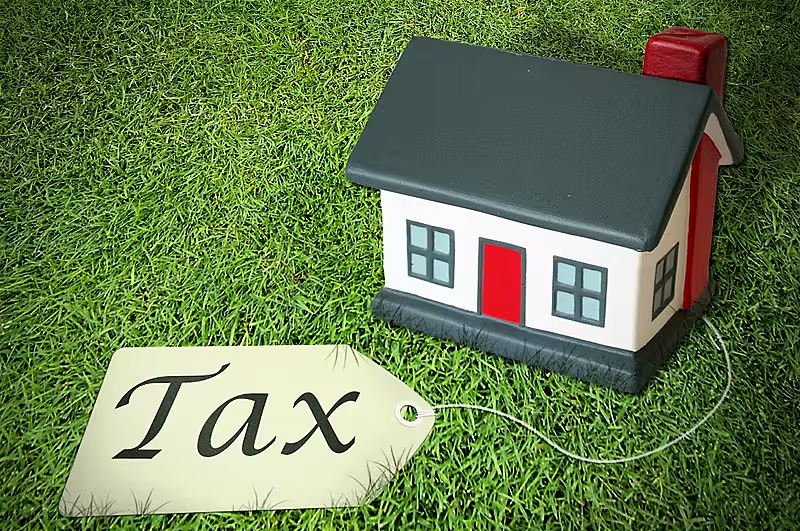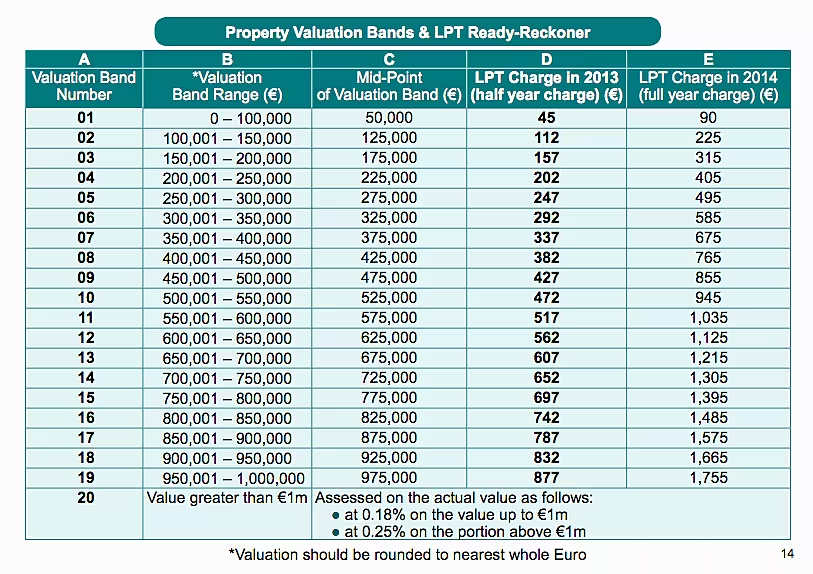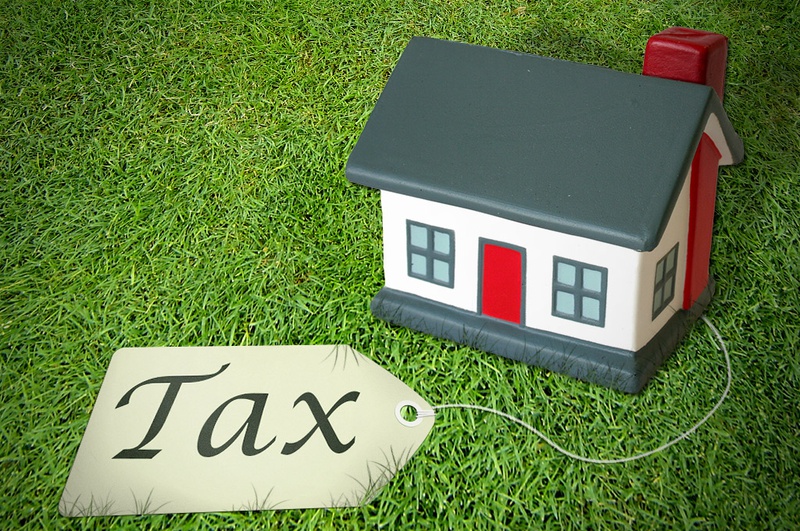
The new Local Property Tax will come into force on July 1
st 2013.Here MyHome.ie looks at what this means for you and tells you who is liable for the tax.
From last December’s Budget:
- A property tax has been introduced at a rate of 0.18% for properties valued up to €1 million and at a rate of 0.25% for properties valued at over €1 million.
- The tax will be based on the market value as assessed by the owner of the property. You can use MyHome.ie’s Property Tax calculator to get a rough guide of what you will pay. The Revenue Commissioners, who will be collecting the property tax, will also provide a valuation guide to help people make a fair assessment.
- Properties with a value of more than €100,000 will be assessed at the mid-point of the valuation band. So, for example, a property valued between €150,001 and €200,000 will be assessed at 0.18% of €175,000. Properties valued below €100,000 will be assessed at 0.18% of €50,000.
- The rates of 0.18% and 0.25% will not change during the lifetime of the current government.
- Initial valuations will be valid up to and including 2016.
- First time buyers will be exempt from the property tax for four years.
- Anyone who buys a previously unoccupied home will be exempt up until the end of 2016.
- As with the household charge, certain properties will be exempt from the charge. This list has not yet been determined but is likely to include the likes of ghost estates etc, which were also exempt from the household charge.
- A deferral period is also available up until the end of 2017 for those on low incomes.
- Revenue will strictly enforce the new tax and collect any outstanding money owed on the household charge. Arrears on it not paid by July 1st 2013 will be increased to €200.
- From 2014 PRSI will be payable on income generated from wealth, including rental and investment income
- The NPPR or second home charge will be abolished form January 1st 2014.
- Local authorities have the power to vary rates, however, based on their funding needs.
Calculating the Local Property Tax
Revenue will issue a LPT Return to residential property owners in March 2013 for completion. You will be obliged to value your property, calculate your LPT liability, confirm your payment option and submit your Return by the relevant deadline (7th May if submitting a paper Return and 28th May if submitting your Return on-line).
The amount you pay will depend on the market value of your residential property on 1 May 2013. Property values will be organised into market value bands.
The tax liability will be calculated by applying the tax rate to the mid-point of the band. The rate of LPT will be 0.18% for properties up to a market value of €1m. Residential properties valued over €1m will be assessed at the actual value at 0.18% on the first €1m in value and 0.25% on the portion of the value above €1m (no banding will apply).
The table below contains a ready-reckoner of LPT calculations for 2013 and 2014. Amounts of LPT are rounded down to the nearest Euro.

So who is liable?
- Owners of Irish residential property, regardless of whether they live in Ireland or not.
- Local authorities or social housing organisations that own and provide social housing.
- Lessees who hold long-term leases of residential property (for 20 years or more).
- Holders of a life-interest in a residential property.
- Persons with a long-term right of residence (for life or for 20 years or more) that entitles them to exclude any other person from the property.
- Landlords where the property is rented under a short-term lease (for less than 20 years).
- Personal representatives for a deceased owner (e.g. executor/administrator of an estate).
- Trustees, where a property is held in a trust.
- Where none of the above categories of liable person applies, the person who occupies the property on a rent-free basis and without challenge to that occupation.
If you are the liable person in respect of the property you are responsible for completing and submitting the return and paying the tax due.
For LPT purposes, residential property means any building or structure (or part of a building) which is used as, or is suitable for use as, a dwelling and includes any shed, outhouse, garage or other building or structure and includes grounds of up to one acre.
If you own a residential property on 1 May 2013, you are liable for LPT for 2013. If you sell your property after 1 May 2013 you are still liable to LPT for 2013 and the liability is payable in full at the time of the sale.
Where there is more than one owner of the residential property, they need to agree who will make the relevant LPT Return and pay the tax. If no one pays, Revenue can proceed to collect the tax due from any of the owners.
Some properties will be exempt from LPT.
These include:
- New and previously unused properties that are purchased from a builder or developer between 1 January 2013 and 31 October 2016 will be exempt until the end of 2016.
- Properties purchased by a first time buyer between 1 January 2013 and 31 December 2013 will be exempt until the end of 2016. The exemption is subject to certain conditions, including that the property must be the person’s sole or main residence. If the property is subsequently sold or ceases to be the person’s main residence between 2013 and 2016, the exemption no longer applies.
- Properties constructed and owned by a builder or developer that remain unsold and have not yet been used as a residence.
- Properties in unfinished housing estates (commonly called "ghost estates"), to be specified by the Minister for the Environment, Community and Local Government.
- Residential properties owned by a charity or a public body and used to provide accommodation and support for people who have a particular need in addition to a general housing need to enable them to live in the community such as sheltered accommodation for the elderly or the disabled. A "charity" must be granted an exemption for tax purposes by the Revenue Commissioners to avail of this exemption.
- Registered Nursing Homes.
- A property previously occupied by a person as his or her sole or main residence that has been vacated by the person for 12 months or more due to long term mental or physical infirmity. An exemption may also be obtained where the period is less than 12 months, if a doctor is satisfied that the person is unlikely at any stage to return to the property. In both cases, the exemption only applies where the property is not occupied by any other person.
- Mobile homes, vehicles or vessels.
- Properties fully subject to commercial rates.
- Diplomatic properties.
Revenue will issue a LPT Return to residential property owners in March 2013 for completion. To claim an exemption you must complete your Return and indicate the exemption condition you satisfy. Returns should be submitted by the relevant deadline (7th May if submitting a paper return and 28th May if submitting your return on-line).
Key dates for the property tax
- March 2013: Revenue will issue LPT Return form and information to residential property owners.
- 1 May 2013: Property Valuation and Property Ownership date.
- 7 May 2013: Due date for filing paper LPT returns.
- 28 May 2013: Due date for filing LPT returns electronically.
- 1 July 2013 onwards: Commencement of deduction at source from Salary / Occupational Pension or certain payments from the Department of Social Protection and Department of Agriculture, Food and the Marine.
- 1 July 2013 onwards: Commencement of cash payments (including debit/credit card) through certain payment service providers.
- 15 July 2013 onwards: Commencement of direct debits.
- 21 July 2013: Single Debit Authority Payment deducted.
Payment options
Revenue will offer a range of methods for paying the tax. You can opt to make one single payment or opt to phase your payments in equal instalments from 1 July 2013 until the end of the year.
- Single Debit Authority
- Deduction at source from your salary or occupational pension
- Deduction at source from certain payments received from the Department of Social Protection
- Deduction at source from scheme payments received from the Department of Agriculture, Food and the Marine
- Direct Debit
- Debit/Credit Card
- Cash payments (including Debit/Credit Card) through approved payment service providers
You can only select one method of payment on the LPT return.
If you wish to pay by cheque, bank draft or postal order, please enclose this with your completed return.
With regard to Single Debit Authority, debit/credit card, direct debit and cash payment options, your Financial Institution or payment service provider may levy charges.
Deferral
A system of deferral arrangements for owner-occupiers will be implemented to address cases where there is an inability to pay the LPT under specified conditions. The deferred tax remains a charge on the property until the property is sold or transferred to another person.
Interest will be charged on deferred amounts at a rate of 4% per annum. The deferred amount, including interest, will be a charge on the property and will have to be paid to Revenue on the sale/transfer of the property.
The following are the conditions to qualify for a full deferral:
- The property must be the sole or main residence of the liable person.
- Owner-occupiers may apply for full deferral of the LPT charge where their estimated gross income from all sources does not exceed €15,000 for a single person and €25,000 for a couple during the relevant year (for the first Return this will be the estimated gross income for 2013).
- For owner-occupiers who have an outstanding mortgage, an adjusted gross income limit will apply. The income thresholds of €15,000 for a single person and €25,000 for a couple may be increased by 80% of their gross mortgage interest. This applies until 31 December 2017.
The following are the conditions to qualify for a partial (50%) deferral:
- The property must be the sole or main residence of the liable person.
- Owner-occupiers may apply for partial deferral where the estimated gross income from all sources, during the relevant year, is less than €25,000 in the case of a single person and €35,000 in the case of a couple. In these cases the owner-occupier will qualify for deferral of 50% of the LPT liability and the balance of 50% of the tax must be paid.
- For owner-occupiers who have an outstanding mortgage, the partial deferral income thresholds of €25,000 (single) and €35,000 (couple) may be increased by 80% of their gross mortgage interest. This applies until 31 December 2017. In these cases the owner occupier will qualify for deferral of 50% of the LPT liability and the balance of 50% of the tax must be paid.
Failure to pay
When Revenue sends you your LPT Return form, we will also include a Revenue Estimate of your LPT liability. It is important to note that this Revenue Estimate is not a valuation of a property nor should it be regarded as an accurate calculation of LPT liability.
If you don’t submit a Return, or contact Revenue to say why you are not liable Revenue will pursue you for this estimated amount of tax using a range of collection options including:
- Mandatory deduction from 1 July 2013 from your employment income, occupational pension or certain Government payments.
- Attachment of your bank account.
- Referral of the debt to a Sheriff or a Solicitor for collection.
- The withholding of any refund of other tax as payment against LPT due.
Because you have a Revenue debt, you will also not qualify for a Tax Clearance Certificate.
Self-employed persons or companies will also be liable to a late filing surcharge on Income Tax or Corporation Tax Returns
Interest charges at 8% per annum apply to late payment of LPT and penalties may also arise.
Any unpaid LPT attaches to the property and you will not be able to sell it without paying any LPT, interest and penalties due.





